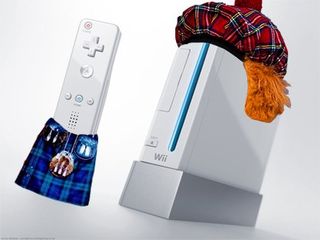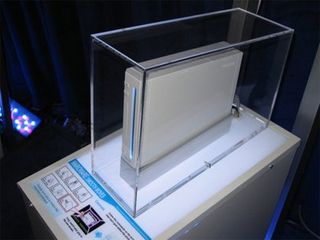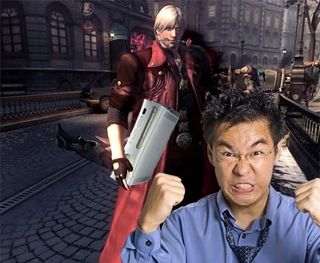How the hell was this ever controversial?!
We look back at gaming's most debatable decisions
Why it caused such a stink
Rewind to TGS in 2005 and the shock within the attending crowd, as Nintendo bigwig Satoru Iwata unveiled the console and its controller, was palpable. The controversy stemmed from Nintendo deviating from conventional wisdom by making their console substantially less powerful than their competitors’ machines. Sure, the Wiimote was innovative. But it was also strange, foreign and no one was quite sure how it would work with the actual games.

Above: The Nintendo Wee - cementing cultural stereotypes
Fast forward to pre-E3 2006 and that shock had turned into childish sniggers and name calling, when the name for their fifth home console was changed from Revolution to Wii. Even people in the industry couldn’t contain their bile. Ernest Adams, game design lecturer and columnist, remarked: ‘Nintendo has just named its console in a way that sounds like a slang word for urine. Or the Scottish word for "small," and by implication, insignificant.’
Couple this with a pre-launch advertising campaign focused more on pretty people playing games than the games themselves, plus the fact it was aimed more at your granddad and little sister than the traditional hardcore gamer who’d kept the N64 and Gamecube afloat, and it really seemed like the company had jumped the shark.
Why it really wasn’t a big deal
Well, 34 million Wii owners can’t be wrong, can they? Nintendo had an innate confidence in their console, its name and the market they wanted to appeal to. And, thanks to a canny, if cringe-worthy ad campaign, they were able to strike a nerve with the general public. As a result, what was once an innovative and slightly baffling piece of state-of-the-art technology, is now something your mum is more comfortable using than you.
Sign up to the GamesRadar+ Newsletter
Weekly digests, tales from the communities you love, and more

Above: Nintendo's baby pre-mountains of souless shovelware
By concentrating on inclusive casual gaming, Nintendo have tapped into a market that never existed before and are now absolutely creaming it in. Look at Nintendo’s direction for the Wii from a business perspective and it’s about as controversial as betting on Michael Phelps to do quite well at going up and down a swimming pool.

Why it caused such a stink
If fanboys are dismissive about games appearing on their rival platforms, they’re anything but if one of the cherished exclusive franchises from their beloved console crosses those murky multi-platform waters.

Above: What PS3 DMC fans were promised...
That’s why some fans of Devil May Cry and Final Fantasy started online petitions to Capcom and Square Enix when the companies revealed the previously exclusive PlayStation series would be appearing on the 360. The most hardcore fanboys of the former were so disgusted with DMC 4 going to a Microsoft console that over 12, 000 of them vowed to boycott buying any further Capcom games when they put their signatures to Petition Online.
Why it really wasn’t a big deal
Because almost all third party games are multi-platform now and the practice of porting titles over to multiple machines is industry standard. What's more, fanboys are narrow-minded souls whose exclusive attitude will never carry much weight in a market where business models for most developers are founded on inclusiveness – i.e. selling their games to as many punters as possible. No one who was going to buy DMC 4 or the next Final Fantasy has ever been denied that right - well, aside from the three Japanese people who own 360s and want FF XIII - and so the controversy only lay in the minds of reasonless fanboys.

Above: What PS3 DMC fans got

David has worked for Future under many guises, including for GamesRadar+ and the Official Xbox Magazine. He is currently the Google Stories Editor for GamesRadar and PC Gamer, which sees him making daily video Stories content for both websites. David also regularly writes features, guides, and reviews for both brands too.

Stellar Blade director "grew up too poor to afford" a PS1, but when he finally got one in college, Ridge Racer and Final Fantasy inspired him to make games

Oh, that's why the Stellar Blade devs were terrified by demo players: one fan's spent "about 60 hours" maxing Eve's skill tree before the action RPG is even out
Most Popular


